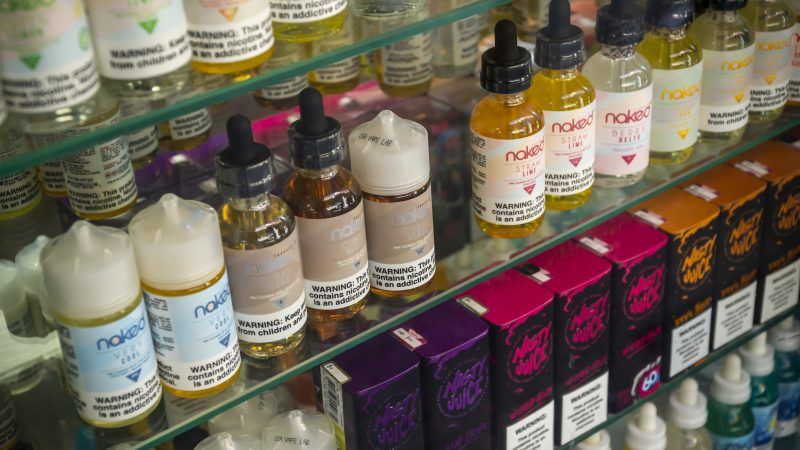FDA Announces Ban on Flavored E-Cigarette Cartridges, Exempting E-Liquids Used in Refillable Vapes
For now, the FDA is targeting the vaping products that are most popular with teenagers. But the industry still faces a potentially devastating regulatory deadline.

Today the Food and Drug Administration (FDA) officially announced its new restrictions on flavored e-cigarettes. As expected, the policy applies to cartridge-based products such as Juul and Vuse, which will be limited to menthol and tobacco flavors. The FDA will not be targeting flavored e-liquids used in refillable vaporizers.
"Under this policy," the FDA says, "companies that do not cease manufacture, distribution and sale of unauthorized flavored cartridge-based e-cigarettes (other than tobacco or menthol) within 30 days risk FDA enforcement actions." FDA Commissioner Stephen Hahn explains that the agency aims to "combat the troubling epidemic of youth e-cigarette use" by eliminating "certain flavored e-cigarette products we know are so appealing to teenagers—so-called cartridge-based products that are both easy to use and easily concealable."
The FDA acknowledges the harm-reducing potential of "electronic nicotine delivery systems" (ENDS) as an alternative to smoking. "By not prioritizing enforcement against other flavored ENDS products in the same way as flavored cartridge-based ENDS products," it says, "the FDA has attempted to balance the public health concerns related to youth use of ENDS products with considerations regarding addicted adult cigarette smokers who may try to use ENDS products to transition away from combustible tobacco products." Secretary of Health and Human Services Alex Azar, whose department includes the FDA, likewise says "our action today seeks to strike the right public health balance by maintaining e-cigarettes as a potential off-ramp for adults using combustible tobacco while ensuring these products don't provide an on-ramp to nicotine addiction for our youth."
Technically, the FDA wants us to know, it is not imposing a ban on flavored e-cigarette cartridges, since "all ENDS products currently on the market are considered illegally marketed and are subject to enforcement, at any time, in the FDA's discretion." Rather, the FDA is using its enforcement discretion to target the products that are most popular with teenagers.
Rather ominously, the FDA warns that its policy—which certainly should not be confused with a ban—could be expanded if that seems appropriate. "Because of the relatively low numbers of youth using both menthol- and tobacco-flavored, cartridge-based ENDS products, these products are not among the current enforcement priorities," it says. "However, should the FDA become aware of an increase of youth using any other flavored products (both cartridge-based or otherwise), the agency will take additional steps to address youth use of those products if necessary." Since at least some adolescent vapers who like cartridge-based e-cigarettes will switch to menthol or tobacco when the flavors they currently prefer become harder to get, while others may switch to refillable vaporizers, those "additional steps" seem inevitable.
Meanwhile, the vape shops that were spared by the exemption for flavored e-liquids used in open systems still depend on sales of products that "are considered illegally marketed." Those products will remain in that perilous category unless the FDA decides that letting them stay on the market is "appropriate for the protection of public health." To persuade the FDA of that, manufacturers (including vape shops that mix their own e-liquids) have to submit "pre-market tobacco product applications" (PMTAs) by May 12, a process that will be prohibitively expensive for the vast majority of businesses and products.
"By allowing vape shops to continue selling flavored vape liquids, the FDA is preventing hundreds of thousands of ex-smokers from being forced to return to smoking," writes Boston University public health professor Michael Siegel. "It also ensures that this important off-ramp from smoking remains available to adult smokers. However, the battle is not yet over because if the FDA implements the PMTA deadline in May of this year, it will wipe out most of the vaping industry, handing it over to the tobacco companies. The results would be devastating to the public's health, as many ex-smokers would return to smoking and many more would turn to a new black market for these products."
Show Comments (29)